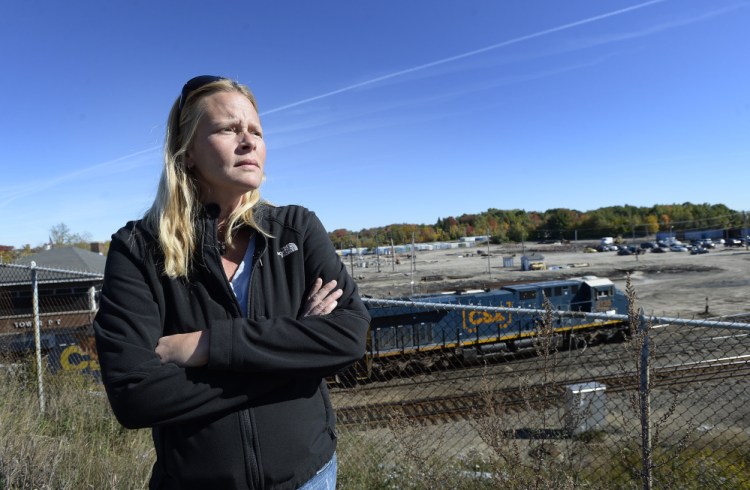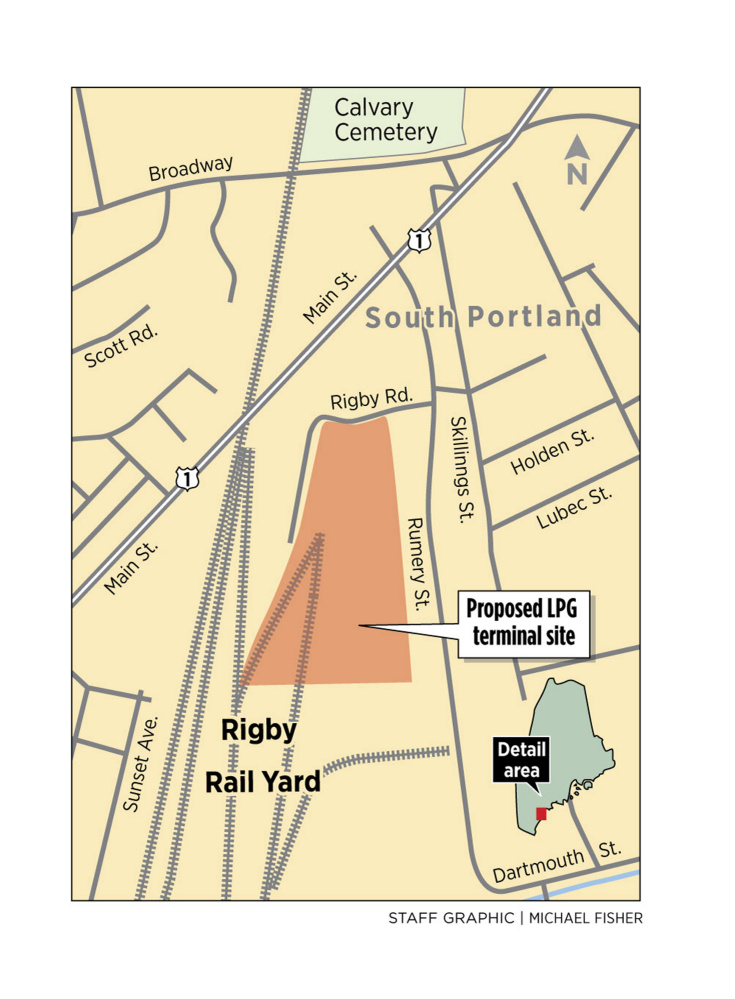SOUTH PORTLAND — Trina Stoehr grew up near Rigby Yard. Many of her neighbors worked on the railroad. She’s familiar with the rumble and roar of the diesel engines and the clanking cars that roll through what is widely considered the largest rail yard in New England.
What she can’t envision at Rigby Yard – a 245-acre industrial site that sprawls between the Cash Corner and Thornton Heights neighborhoods off Route 1 – is the addition of a fuel depot that would distribute upwards of 480,000 gallons of liquefied petroleum gas daily.
That’s what NGL Supply Terminal Co. wants to build at Rigby Yard to replace its existing liquid propane depot on Commercial Street in Portland, where the state is expanding the International Marine Terminal.
Faced with growing opposition to a previous proposal, NGL submitted a downsized plan for Rigby Yard last month. It calls for one 24,000-gallon storage tank and track queuing space for 24 rail tank cars, each carrying 30,000 gallons of propane.
Under the current proposal, there could be as many as 744,000 gallons of propane at the 10-acre depot at once, down from more than 1 million gallons under the previous proposal.
The reduced proposal hasn’t quelled the concerns of Stoehr and other residents who continue to oppose NGL’s efforts and use emotional language to express their fear of potential explosions at the rail yard.
“Anything can happen. People make mistakes,” said Stoehr, 44, who returned to the family homestead on Thirlmere Avenue three years ago. “We can close our eyes and hope nothing happens, but if it does, we’re all goners.”
The City Council and other municipal officials are set to hear residents’ concerns about the NGL proposal during a workshop Wednesday that starts at 6:30 p.m. They’ll also discuss possible amendments to municipal fire protection and prevention ordinances that could have broader implications in a port city with 87 massive fuel storage tanks. Moreover, there are two existing propane storage facilities in the city: on Lincoln Street, near Interstate 295; and on outer Broadway, near the Scarborough line.
LOOMING SPRING DEADLINE
NGL is a subsidiary of NGL Energy Partners of Tulsa, Oklahoma, which includes Brunswick-based Downeast Energy. The company’s 4-acre facility in Portland has fixed storage for 280,000 gallons of propane and track capacity for eight cars.
NGL must leave the leased site on Commercial Street by next spring so the Maine Department of Transportation can build a multimillion-dollar cold storage facility. The state has promised to pay for NGL’s move, but state officials have said they don’t plan to help secure another site, and Pan Am Railways, which owns Rigby Yard, has yet to intervene on NGL’s behalf and bring its federal pre-emptions to bear.
NGL has faced growing opposition since submitting its preliminary proposal in February.
Consultants hired by the city determined in June that NGL’s initial plan to install six 60,000-gallon storage tanks at Rigby Yard – 360,000 gallons of fixed storage – would violate a local ordinance that prohibits additional aboveground storage tanks that hold more than 25,000 gallons.
The initial proposal also included track space for 24 filled tank cars, each carrying 30,000 gallons, so an additional 720,000 gallons of propane could have queued up to unload via a racking system.
While the current proposal is still being reviewed by city officials, City Manager Jim Gailey has already met with NGL representatives in an effort to reduce the scope of their plans.
Gailey asked them if Rigby Yard could be a temporary depot while they look for another site. “They were not willing to consider” his request because they have explored their options and believe Rigby Yard is the best site, Gailey said in a memo to city councilors.
Gailey also asked them to reduce the queuing space from 24 to eight filled tank cars, which would reduce the total amount of gas waiting on the tracks to 240,000 gallons. According to the memo, Gailey said they “were not willing to go down to” eight rail cars, but they “would seriously consider” a reduction to 16 rail cars, or 480,000 gallons.
“Our No. 1 concern is the health and safety of the community,” Gailey said last week. “We’ll be looking at making changes to the fire code to mitigate any risks and put people at ease.”
‘NOT IN MY BACKYARD’
Opponents of the current plan question the safety of having a single, 24,000-gallon fixed storage tank as a loading station that’s expected to fill four propane delivery tank trucks per hour from 6 a.m. to 6 p.m., according to NGL’s proposal. The facility would operate for longer hours during periods of high demand, such as in winter.
Opponents say the 24,000-gallon tank would effectively become a tube, because it would have to be refilled constantly in order to fill more than two 10,000-gallon propane transport trucks per hour.
“I’ll be the first to say this is a NIMBY issue,” said Frank Lorello, who lives on Frostwick Street, using the acronym for “Not In My Backyard.”
“That’s a lot of potentially explosive material near residential neighborhoods,” Lorello said. “It should be out in the middle of nowhere.”
In assessing the potential threat of an NGL depot at Rigby Yard, city officials and residents are paying attention to recent news from other communities that have been wrangling with propane companies and railroad operations.
Opponents of the NGL proposal point to the Sunshine Propane storage facility explosion in Toronto in 2008, when a worker was killed and a neighborhood was evacuated. More than 6,000 people were affected and shared a $23 million settlement for damages, according to the Toronto Star. Opponents also note the 2013 rail disaster in Lac-Megantic, Quebec, where a freight train carrying crude oil derailed and exploded downtown, killing 47 people.
The city of Portsmouth, New Hampshire, has been locked in court battles for nearly a year with Pan Am and other companies over propane storage and distribution facilities in downtown Portsmouth and nearby Newington.
The town of Westford, Massachusetts, made headlines in February 2014, when a freight train hauling two propane tank cars derailed one night. Pan Am officials failed to notify municipal authorities because there had been no spill or injuries. The local fire chief spotted the derailment the next morning when he drove by. Pan Am officials also initially refused to speak with Town Manager Jodi Ross.
“There has been some improvement since that time,” resulting in better communication, training and reporting, Ross said. “Luckily, we haven’t had any derailments since then, but there’s a long way to go to keep all of us safe.”
Ross said she believes there must be improved federal regulation of railroad safety, especially related to transportation of hazardous materials through communities. She also recommended that South Portland officials take steps now to ensure optimum communication with NGL and Pan Am in the future.
‘SPECTACULAR’ SAFETY RECORD
NGL representatives have touted a clean safety record and a willingness to work with city officials to comply with existing ordinances.
“NGL maintains a spectacular employee safety record and has not been involved in any incidents impacting the environment or public safety,” according to the company’s current proposal.
City officials have said that bulk storage of liquid propane doesn’t pose a threat as long as appropriate safety measures are met. They also said NGL’s initial depot proposal would have been an improvement over the way liquid propane is handled now at the rail yard.
As many as 100 rail cars loaded with propane pass through Rigby Yard daily with little local security or oversight, said Fire Chief Kevin Guimond. Some propane tank cars already unload their cargo at the rail yard, transferring it directly to delivery trucks operated by AmeriGas, another local propane retailer. Under federal law, companies aren’t required to register cargo with communities along railways while it’s in transit.
Guimond said he’s closely reviewing NGL’s current proposal, which could take several more weeks. It calls for a variety of safety features, such as fencing, security cameras, sensors and hydrants, and it’s around the corner from a municipal fire station.
Guimond noted that a 24,000-gallon storage tank filled with propane and without any safety features or fire protection has a “potentially lethal threat zone” of 484 yards.
“I would have firefighters working in that zone. We’re trained for it. We know how to handle it,” Guimond said. “We require the latest technology in all (facilities in South Portland). Our goal is to make it as safe as possible for everybody.”
Guimond said he plans to factor in the minimizing impact of proposed safety features and calculate the potential threat to nearby residential neighborhoods. He also plans to insist that the 24,000-gallon tank be sited in the safest location.
Despite such assurances, some neighbors of Rigby Yard say they don’t understand why city officials are trying so hard to accommodate NGL’s latest proposal. They include Dan Warren, who lives on Skillings Street, which runs along the west side of the rail yard. He was planting a tree last week in front of the house he shares with his wife, Sandra.
“If zoning doesn’t allow it, why allow this proposal?” Dan Warren asked rhetorically. “It’s right in our backyard and we really don’t want any more fuel storage there.”
Send questions/comments to the editors.




Success. Please wait for the page to reload. If the page does not reload within 5 seconds, please refresh the page.
Enter your email and password to access comments.
Hi, to comment on stories you must . This profile is in addition to your subscription and website login.
Already have a commenting profile? .
Invalid username/password.
Please check your email to confirm and complete your registration.
Only subscribers are eligible to post comments. Please subscribe or login first for digital access. Here’s why.
Use the form below to reset your password. When you've submitted your account email, we will send an email with a reset code.